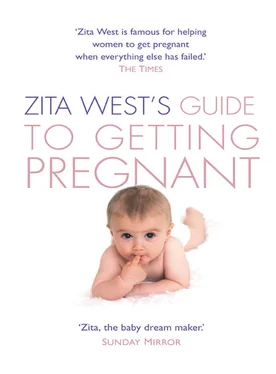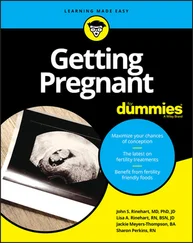The good news is that, because of the continuous 100-day cycle of sperm production, it is possible to improve sperm’s quality relatively easily, by making the necessary health and lifestyle changes.
While the Nutrition chapter (see page 89) offers general guidelines, it is worth mentioning here, too, that when it comes to the sort of adequate nutrition that makes a difference, there is no point grabbing a general multi – vitamin, or an expensive supplement, unless you know what you’re getting and what you need. Before that, it’s worth looking at your general diet and how to improve it.
Generally speaking, the fresher and less processed the food you eat, the better. Many people advocate organic foods, and there is a good argument for this. In one Danish study, an unexpectedly high sperm count was found among organic farmers. Their sperm count was twice as high as that of a control group of blue – collar workers. But it’s tricky, because if it’s a choice between organic beans flown in from Kenya that have taken five days to get to your supermarket shelf and have then sat in your fridge for two days, and some locally – produced beans that are not organic but were picked yesterday, you might want to choose the latter, as the vitamin and mineral content of the fresher food will be higher, and washing it carefully will help remove chemical and pesticide residues.
Now is not the time to go on some extreme weight – loss diet, either. Some men opt for high – protein diets to lose weight, but we have noticed anecdotally that men following this type of diet have poor sperm. There’s evidence to show that extreme diets, like the low – carb ones in such favour these days, increase the body’s acidity if not actually leaving you malnourished, which won’t be good for sperm production. Better to adjust the balance of what you eat, increase your exercise a little, and reduce your weight that way.
Ideally, you should follow the guidelines set out in the Nutrition and Lifestyle chapters.
Try also to eat a proportion of your foods, especially fresh fruit and vegetables, raw. And when you do cook, try steaming and grilling rather than boiling or frying, which will preserve more of your food’s nutritional value.
It is probably a good idea to cut out all highly processed foods, if you can, as they are alarmingly high in hidden fats, sugars and chemical preservatives. In addition, the nutritional content of food is greatly reduced during processing. Opt for whole foods where you can.
If this feels rather overwhelming, start gradually, introducing a different change into your diet week by week as you adjust.
Water
When it comes to what you drink (and alcohol is covered separately: see page 62), make sure you are not over – doing your caffeine intake. Caffeine is mildly addictive, so if you are used to drinking a lot it may take a while to kick the habit. There is also some evidence to show that if a man has a high caffeine intake before conception, the risk of premature birth is increased. Tea contains tannin, which is less of a stimulant than caffeine, but excess quantities will deplete you of iron.
Most men do not drink enough water. Sperm need to swim!
Start changing your drinking habits first of all by increasing your water intake – most of us drink too little, generally, to be adequately hydrated.
There is a lot of research available now about free radical damage to sperm, but thankfully there’s a lot you can do to improve this. To produce sperm your body needs a good intake of certain nutrients, which may need supplementing if they are not readily available from your diet. Research has shown that certain vitamins and minerals improve overall sperm counts – I’ve seen it many times. It is important, however, to remember not to exceed the recommended daily allowance (RDA) of any one item, even if you have heard that it might be beneficial, unless under supervision from a health professional. An excess of one item can deplete others, so a balance is needed.
Also see the Nutrition chapter for more advice on how to improve your diet to increase the chances of conception.
Vitamin C
A well – known antioxidant, under normal conditions vitamin C protects sperm from oxidative damage, and certainly improves sperm quality in men who smoke. However, some men have a condition of their sperm called ‘agglutination’ where sperm clump together and fertility is reduced. In these cases, vitamin C supplementation of up to 1 gram a day helps reduce agglutination – and was shown to increase fertility in one group of men in a controlled study.
Zinc
Semen is rich in zinc, and men lose a certain amount of this mineral per ejaculate. Zinc is often referred to as the ‘fertility mineral’ and its presence in foods like oysters, which are said to have aphrodisiac properties, may reinforce this idea! Certainly an insufficiency of zinc can lead to both reduced numbers of sperm and impotence in some men. It has also been found that the levels of zinc in the semen of infertile men are of a lower level than in fertile men. Numerous studies have been done, and some of the results seem to conflict, but overall there is enough evidence to suggest that for men with poor sperm quality, sperm count and sperm motility, a supplement of zinc can help.
In areas of the country where the copper content of water is naturally high there may be a general zinc deficiency, as these two minerals have to be in balance: an excess of copper can reduce zinc. Conversely, where long – term zinc supplementation is recommended, then supplementation with copper is needed.
Vitamin B12
Necessary to maintain fertility, there are studies that have shown an improvement in sperm motility where oral vitamin B 12was given. In the latter case, around 60 per cent of those men who received an oral supplement of vitamin B 12(1,500 mcg per day of methylcobalamin) had improved sperm counts.
Vitamin E
Certainly a deficiency in vitamin E, in animals, leads to infertility. In one human trial, the giving of 100–200 iu of vitamin E daily to both partners led to a significant increase in fertility. Vitamin E seems to reduce the amount of free – radical damage done to cells. Supplementing reduces the amount of oxidative stress on sperm cells, although it should be said that the research is at a preliminary stage and needs further work before a definite case for sperm improvement can be made.
Co-enzyme Q10
This is a nutrient used by the body’s cells in the production of energy. Its exact role in the production of sperm isn’t known, but there is evidence to show that as little as 10mg a day over a two – week period will improve both sperm count and motility. In one study, where men with low sperm counts were given 60mg a day over a three – month period, although no significant change was observed in most measures of sperm quality and quantity, in – vitro fertilization rates improved significantly.
Selenium
This is an essential trace mineral that acts with the antioxidant vitamins A, C and E, and is found in large quantities in Brazil nuts. In one double – blind study of infertile men, supplementation of 100 mcg per day of selenium for three months significantly increased sperm motility, but not sperm count.
Calcium
The motility of sperm is partly determined by the concentration of calcium in semen, and this mineral is also a key regulator of human sperm function. However, although we know it is important there has been no evidence to confirm that a calcium deficiency causes male infertility. Neither is there any evidence to show that calcium supplementation improves male infertility.
Читать дальше












